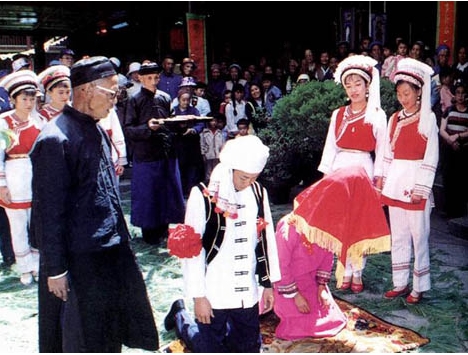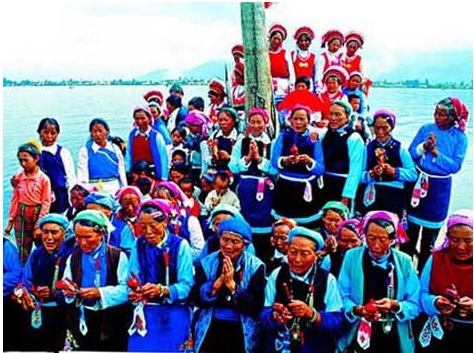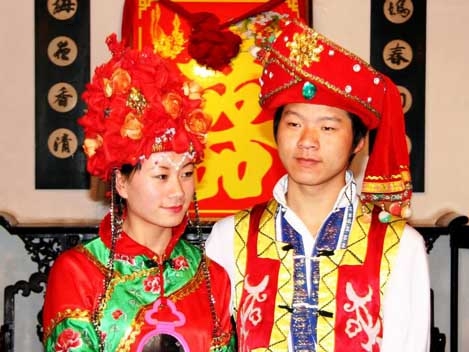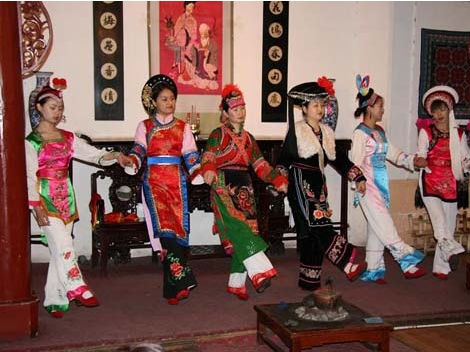
 \
\


The Bai ethnic group mainly engages in agriculture and fishery. The Bai people are very hospitable. They treat their guests to baked tea whenever they come to visit. Colloquially called "three courses of tea", the tea is bitter in the first course, sweet in the second and most memorable after the third. In some places, they add honey and a Chinese spice into the baked tea, which leaves a lingering and refreshing mellow after-taste.
Bai people's family size is small. Sons tend to live separated from their parents after getting married. There are also a few large families where all four generations live together. Each clan has a Shaikh, who decides major business and settles disputes. Bai people keep the tradition of monogamy. They are not allowed to intermarry with someone with the same surname or from the same clan, but they are allowed to marry people from other ethnic groups.
If a girl agrees to a marriage proposal, she should give the man a piece of baba (rice cake). In the wedding, the bride will make a thick fish soup for the guests. The bride will also make a large flour cake for the family in the first mid-autumn festival after the wedding.
After a young man and a young woman get engaged based on free love or with the help of a matchmaker, the young man's family must have a wedding tent erected before the marriage date. On the eve of the wedding day, they should invite those who are good at Chinese opera to perform in the tent. People appreciate the performance while enjoying fruits, tea and wine prepared by the host. The performance lasts till midnight. Then all the people present share a bowl of tangyuan (boiled rice dumplings) after the performance to express their wishes for a great reunion.
On the wedding day, the bridegroom's family begins to arrange a banquet to entertain guests in the morning. When guests are enjoying good dishes after having rice wine, the bridegroom and his groomsman begin to toast to guests one table after another. Music played with a suona horn can be heard.
To carry the bride on the back is a typical marriage tradition in the Dali Bai Autonomous Prefecture, Yunnan Province. Whenever the bride and the groom pass a crossing, people will stop and wait for the groom to carry the bride on his back and walk around the marriage portion in the shape of the number "8."
In some other places, the bridegroom does not go to meet the bride to escort her to his home for the wedding. It is the groomsman that goes to meet her listening to suona music under the leadership of the matchmaker. When they arrive at the gate of the bride's home, only after suona players have played joyous and bright items loudly for six times would several relatives of the bride's family go out to welcome them into the house.
Senior members of the bridegroom's family are waiting at the gate of his house for the arrival of the bride and other people. As soon as they enter the house, the bride goes upstairs accompanied by the bridesmaid and senior female members of the bridegroom's family to dress up. After she dresses up and gets ready to enter the nuptial chamber, two little boys of 10 years old or so rush into the nuptial chamber with pine torches in their hands from the starting point of the stairs in people's joyful laughter and talking. Then the bride accompanied by two bridesmaids runs into the chamber while people scramble to pinch her and laugh happily.
After the bride enters the nuptial chamber, a ceremony is held for the new couple to kowtow to the Heaven and Earth, and to the parents. The next day, the bridegroom sends the God of Happiness to the home of the bride's parents and the bride pays her first visit after marriage to her parents. In general, the bride returns to her new home the same day. If it is far away, she stays in her parents' home for the night. This signifies the end of the wedding ceremony.
Bai people's family size is small. Sons tend to live separated from their parents after getting married. There are also a few large families where all four generations live together. Each clan has a Shaikh, who decides major business and settles disputes. Bai people keep the tradition of monogamy. They are not allowed to intermarry with someone with the same surname or from the same clan, but they are allowed to marry people from other ethnic groups.
If a girl agrees to a marriage proposal, she should give the man a piece of baba (rice cake). In the wedding, the bride will make a thick fish soup for the guests. The bride will also make a large flour cake for the family in the first mid-autumn festival after the wedding.
After a young man and a young woman get engaged based on free love or with the help of a matchmaker, the young man's family must have a wedding tent erected before the marriage date. On the eve of the wedding day, they should invite those who are good at Chinese opera to perform in the tent. People appreciate the performance while enjoying fruits, tea and wine prepared by the host. The performance lasts till midnight. Then all the people present share a bowl of tangyuan (boiled rice dumplings) after the performance to express their wishes for a great reunion.
On the wedding day, the bridegroom's family begins to arrange a banquet to entertain guests in the morning. When guests are enjoying good dishes after having rice wine, the bridegroom and his groomsman begin to toast to guests one table after another. Music played with a suona horn can be heard.
To carry the bride on the back is a typical marriage tradition in the Dali Bai Autonomous Prefecture, Yunnan Province. Whenever the bride and the groom pass a crossing, people will stop and wait for the groom to carry the bride on his back and walk around the marriage portion in the shape of the number "8."
In some other places, the bridegroom does not go to meet the bride to escort her to his home for the wedding. It is the groomsman that goes to meet her listening to suona music under the leadership of the matchmaker. When they arrive at the gate of the bride's home, only after suona players have played joyous and bright items loudly for six times would several relatives of the bride's family go out to welcome them into the house.
Senior members of the bridegroom's family are waiting at the gate of his house for the arrival of the bride and other people. As soon as they enter the house, the bride goes upstairs accompanied by the bridesmaid and senior female members of the bridegroom's family to dress up. After she dresses up and gets ready to enter the nuptial chamber, two little boys of 10 years old or so rush into the nuptial chamber with pine torches in their hands from the starting point of the stairs in people's joyful laughter and talking. Then the bride accompanied by two bridesmaids runs into the chamber while people scramble to pinch her and laugh happily.
After the bride enters the nuptial chamber, a ceremony is held for the new couple to kowtow to the Heaven and Earth, and to the parents. The next day, the bridegroom sends the God of Happiness to the home of the bride's parents and the bride pays her first visit after marriage to her parents. In general, the bride returns to her new home the same day. If it is far away, she stays in her parents' home for the night. This signifies the end of the wedding ceremony.
Source:
http://traditions.cultural-china.com/en/115Traditions4067.html





